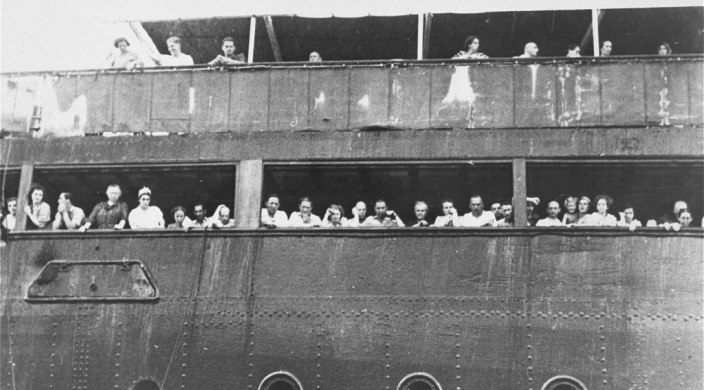
As Jews, the recent surge in xenophobic policies and anti-immigrant sentiment in the United States raises alarm because we remember what it’s like to be refugees unwelcome on America’s shores.
In 1939, the MS St. Louis departed Europe with 937 mostly German Jews fleeing Nazi persecution. Eighty years ago last week, the ship was forced to leave Florida and return to Europe after the Roosevelt administration prevented the refugees on board from receiving safe harbor in the United States.
One of us has a direct connection to the MS St. Louis. During her senior year of college, Ally learned she had family on board the ship. She reflects:
While my paternal grandfather and great-grandparents were able to flee their native Germany shortly after the Nuremberg Laws were enacted, my grandfather’s aunt, uncle, and two teenage cousins remained in the country. But Kristallnacht proved to be a turning point and the family of four boarded the MS St. Louis, with hope that life in America would provide the safety that Germany no longer could. The Jacobys were among the 224 individuals to be taken in by France in June 1939, after the ship was turned away from Cuba, the U.S., and Canada.
After Germany invaded France in the late spring of 1940, my grandfather’s aunt and cousins were sent to Gurs internment camp. His uncle was detained in a separate internment camp, Saint-Cyprien, and later sent to Camp des Milles. Miraculously, the Jacobys secured U.S. visas and arrived in the U.S. in the fall of 1941. Hundreds of others from their ship were not as lucky.
Most of the passengers were placed in internment camps upon their return and many were later murdered in the Holocaust. The Roosevelt administration’s decision to turn away the St. Louis passengers was directly connected to a rise in xenophobia and anti-Semitism across Europe and North America. Many believed refugees would pose a national security threat, create competition for scarce jobs, or become an economic burden.
It is imperative that today’s leaders learn from the tragedy of the St. Louis. Immigration and refugee policies must be founded on principles of justice, compassion, dignity, and human rights.
Starting early in his tenure, President Trump began issuing a series of travel bans, with the current version restricting entry to the U.S. for people from eight countries: Libya, Yemen, Syria, Somalia, Iran, Chad, Venezuela, and North Korea. These bans place heavy restrictions on predominantly Muslim-majority countries. The Supreme Court upheld the third iteration of the travel ban on June 26, 2018.
On April 10, 2019, Representative Judy Chu (D-CA-27) and Senator Chris Coons (D-DE) introduced the bicameral NO BAN Act (H.R. 2214, S. 1123), which would broaden the nondiscrimination provision of the Immigration and Nationality Act to prohibit discrimination on the basis of religion (as well as race, sex, nationality, place of birth, or place of residence) and repeal the president’s executive orders creating the discriminatory travel bans.
As Jews, we know all too well the dangers of religious and ethnic discrimination, including what it means to be turned away from America’s shores. We cannot allow similar discrimination against our Muslim siblings. As we mark the 80th anniversary of the U.S. turning away the St. Louis, we encourage you to ask your members of Congress to support the NO BAN Act, helping ensure that other communities do not face the same fate as those on the St. Louis.
Ally Karpel and Talia Kaplan are 2018-2019 Eisendrath Legislative Assistants at the Religious Action Center of Reform Judaism (RAC).
Related Posts


